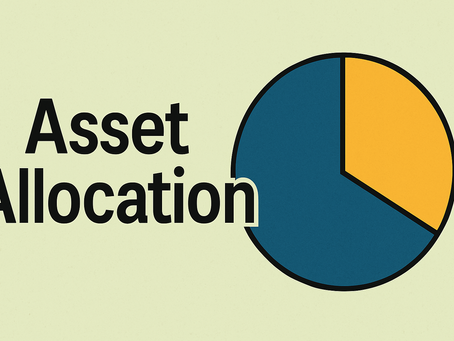top of page

Blog


Read Chapter 1 of AI Money (FREE): Why AI Is the Most Underrated Financial Tool You Have
There’s a quiet revolution happening right now.
It’s not on the news. It’s not going viral on TikTok. But it’s shifting the way smart, everyday people are managing their finances — and building income streams with less stress and more clarity.
That revolution is powered by Artificial Intelligence.
And no, I’m not talking about robot overlords or crypto bros in Teslas.
I’m talking about the tools that are already in your pocket. Tools that can help you...

Larry Jones
12 hours ago4 min read


Financial Word of the Day: Binomial Option Pricing Model
What Is the Binomial Option Pricing Model?
At its core, the Binomial Option Pricing Model assumes something very simple: Over a short period of time, a stock price can do one of two things:
- Go up
- Go down
That’s it. Two possibilities. Hence the word binomial.
The model breaks the life of an option into multiple time steps. At each step, the price moves either up or down by a certain amount...

Larry Jones
2 days ago2 min read


The 7-Day Challenge: Using AI to Find a Money-Making Idea This Week
The 7-Day AI Money-Making Idea Challenge
Here’s your roadmap. One task per day. Each prompt takes less than 15 minutes — but opens up huge doors.
Day 1: Define Your Zone of Genius
Try This Prompt: “What are 5 problems I’ve solved in my own life that others might pay to learn?”
Note: This prompt works really well if you have created your own personal GPT. From my own experience, you can do this quite easily through ChatGPT. You feed your own newly created GPT as much infor

Larry Jones
2 days ago3 min read


Financial Word of the Day: Black-Scholes Model
The Black-Scholes Model is a mathematical formula used to estimate the fair value of options contracts—specifically call and put options. In plain English, it’s a way to calculate what an option should be worth based on a handful of known factors.
Before your eyes glaze over—stay with me. You don’t need to be a hedge fund manager or a math wizard to understand why this matters.
At its core, the Black-Scholes Model tries to answer one simple question...

Larry Jones
2 days ago2 min read


How I Used AI to Start My First Digital Product in 30 Days
If you would’ve told me a few years ago that I’d be launching my own digital products with the help of Artificial Intelligence, I probably would’ve raised an eyebrow.
Not because I didn’t believe in the tech — I just didn’t think I was the type. I wasn’t a programmer. I didn’t have a big team. And honestly, I was juggling life like everybody else — bills, family, work, and other responsibilities.
But here’s the truth: AI changed the game — and helped me move from idea to in

Larry Jones
5 days ago3 min read


Financial Word of the Day: Maximum Drawdown
What Is Maximum Drawdown?
Maximum Drawdown measures the largest peak-to-trough decline in the value of an investment over a specific period of time.
In plain English: It answers the question — “What’s the worst loss I would’ve had to sit through if I owned this investment?”
If an investment grows from $100,000 to $150,000, then drops to $90,000 before recovering, the maximum drawdown isn’t $10,000.

Larry Jones
Jan 232 min read


Financial Word of the Day: Information Ratio
The Simple Definition of Information Ratio
The Information Ratio compares a portfolio’s excess return (how much it beats a benchmark) to the consistency of that outperformance.
Formula (don’t panic): Information Ratio = (Portfolio Return – Benchmark Return) ÷ Tracking Error
You don’t need to memorize that.
What matters is this:
- A higher Information Ratio means better, more reliable outperformance
- A lower Information Ratio means inconsistent or random results

Larry Jones
Jan 212 min read


5 Reasons Artificial Intelligence Is Reshaping How You Build Wealth
There’s a shift happening right now — and if you're paying attention, you can feel it.
The rules of the money game? Being rewritten.
The people winning big? They’re not always working harder. They’re working smarter. They’re using AI.
And whether you’re a creative, a coach, a solopreneur, or still figuring out your path — this is a wake-up call. Artificial Intelligence isn’t just for tech geeks or Silicon Valley.
It’s for you.
Let me show you five reasons AI is flipping

Larry Jones
Jan 143 min read


Financial Word of the Day: Risk Budgeting
What Is Risk Budgeting?
Risk Budgeting is the process of intentionally deciding how much investment risk you’re willing—and able—to take, and then allocating that risk across your portfolio in a disciplined way.
In plain English: It’s not just what you invest in—it’s how much volatility, uncertainty, and downside exposure you allow each investment to have.
Instead of saying, “I’ll put 60% in stocks and 40% in bonds and hope for the best,” risk budgeting asks a smarter ques

Larry Jones
Jan 132 min read


What Is AI Money? Understanding the New Era of Wealth Creation
So, What Is AI Money?
AI Money isn’t just about robots taking jobs or ChatGPT writing your emails.
It’s about leveraging this massive technological shift to create new income, multiply your time, and expand your financial potential—without selling your soul or burning out in the process.
It’s not a “get rich quick” scheme.It’s a mindset shift. It’s a toolkit. It’s a movement.
And in my book, AI Money: How to Use Artificial Intelligence to Supercharge Your Personal Finance

Larry Jones
Jan 122 min read


Financial Word of the Day: Risk Parity
Definition of Risk Parity
Risk Parity is an investment strategy that builds a portfolio by balancing risk, not just dollars. Instead of allocating money based on how much you invest in each asset, risk parity focuses on how much volatility each asset contributes to the overall portfolio.
In plain English: it’s not about how much money you put in—it’s about how much stress each investment puts on your portfolio.

Larry Jones
Jan 122 min read


Financial Word of the Day: Tactical Asset Allocation
Tactical Asset Allocation is a fancy-sounding term for something pretty practical: temporarily adjusting how your money is invested based on current market conditions.
Think of it as steering the ship—not rebuilding it.
The Simple Definition of Tactical Asset Allocation
Tactical Asset Allocation (TAA) is an investment strategy where you make short-term adjustments to your portfolio’s asset mix (stocks, bonds, cash, real estate, etc.) to take advantage of market opportuniti

Larry Jones
Jan 72 min read


Financial Word of the Day: Momentum
Definition of Momentum
In finance and investing, momentum refers to the tendency of an asset’s price, earnings, or financial performance to continue moving in the same direction for a period of time. Simply put: what’s been working lately often keeps working—at least for a while.
Momentum is rooted in human behavior. Investors don’t change their minds overnight. Confidence builds gradually...

Larry Jones
Dec 30, 20252 min read


Financial Word of the Day: Overconfidence
Definition of Overconfidence
Overconfidence (in finance) is a behavioral bias where investors believe they have better knowledge, sharper instincts, or more accurate predictions than they actually do. This confidence leads them to take bigger risks, ignore danger signs, and make decisions based on gut feelings instead of solid strategy.

Larry Jones
Nov 27, 20252 min read


Financial Word of the Day: Loss Aversion
Definition of Loss Aversion
Loss aversion describes our natural tendency to hate losing money more than we enjoy gaining money. In fact, most people feel the pain of a loss about twice as strongly as the joy of a gain. That emotional imbalance leads many folks to make defensive, fearful, or flat-out irrational money decisions.

Larry Jones
Nov 25, 20252 min read


Financial Word of the Day: Efficient Market Hypothesis
Definition of Efficient Market Hypothesis (EMH)
The Efficient Market Hypothesis (EMH) says this: All publicly available information is already baked into current stock prices — instantly.
In other words, you can’t consistently “out-smart” the market by finding hidden gems, secret tips, or under-the-radar opportunities… because the market has already priced those in. Like, immediately.
According to EMH, the only way to beat the market is by taking more risk — not by being s

Larry Jones
Nov 20, 20252 min read


Financial Word of the Day: Modern Portfolio Theory
Definition of Modern Portfolio Theory (MPT)
Modern Portfolio Theory is the idea that you can improve your investment results not by picking perfect individual stocks, but by building a blend of different investments that work well together.
The goal? Maximize your return while minimizing your risk.
In other words: Don’t bet the farm on one horse. Build a team where each player brings something different to the field.

Larry Jones
Nov 19, 20252 min read


Financial Word of the Day: Asset Allocation
What Is Asset Allocation?
Asset allocation is the strategy of dividing your investments across different “buckets” — typically stocks, bonds, and cash — based on your goals, your time horizon, and how much risk you can stomach without losing sleep or stress-eating Chips Ahoy at midnight.
Think of it like building a balanced meal.
Stocks = protein
Bonds = veggies
Cash = carbs

Larry Jones
Nov 18, 20252 min read


Financial Word of the Day: Rebalancing
What Is Rebalancing?
Rebalancing is the periodic process of adjusting your investment portfolio back to its original target mix. In plain English: the market shifts, your allocations drift, and you move things around to get everything back where it’s supposed to be.
If your plan says 70% stocks and 30% bonds, but stocks had a monster year and now you’re sitting at 82/18, rebalancing is the reset button.

Larry Jones
Nov 17, 20252 min read


Financial Word of the Day: Buy and Hold
Definition of Buy and Hold
Buy and Hold is a long-term investment strategy where an investor purchases assets—typically stocks, ETFs, or index funds—and holds them for an extended period, regardless of market fluctuations. The idea is simple: time in the market beats timing the market. Instead of jumping in and out based on daily trends or short-term news, the buy-and-hold investor focuses on the long-term growth of their investments.

Larry Jones
Nov 13, 20252 min read
bottom of page